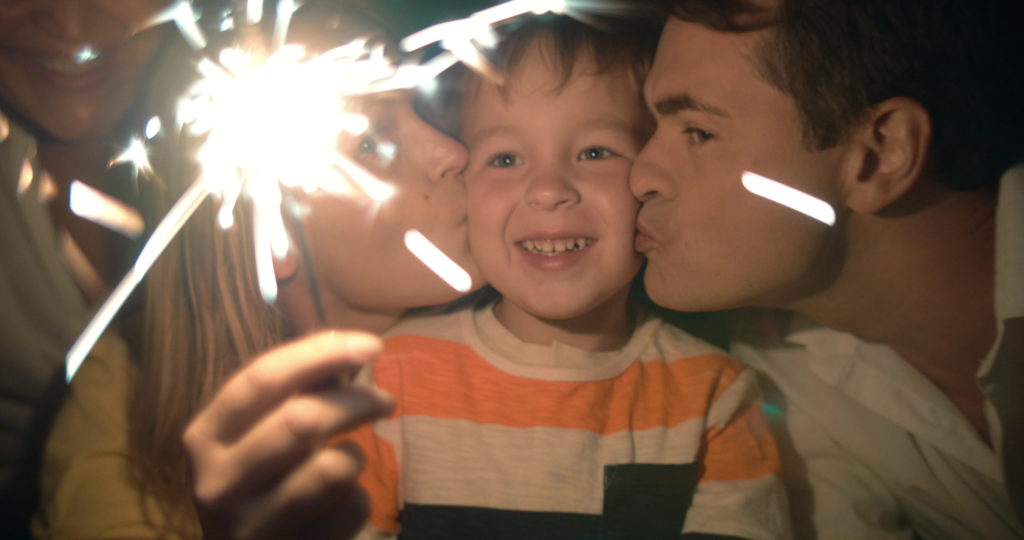This article by guest writer and parenting expert Doug Fields is based on a sermon series entitled Intentional Parenting.

Current Series
Three Essential Practices to Becoming More Like Jesus
Explore the discipleship path Jesus modeled during His time on Earth, built around three powerful principles.
Free MP3Listen NowIt’s never been easier to outsource parenting. But if you want to raise thriving, faithful kids, it’s going to take more than parenting on instinct.
In this article, let’s explore the difference between intentional parenting and quick-fix parenting, and how to keep the endgame in mind. To quickly access each of the sections, use the jump links below.
1. Intentional vs Reactive Parenting
2. Raising Engaged vs. Isolated Kids
3. Defined Boundaries vs. Flexible Boundaries
4. Kid-centric vs Couple-centric Family Structure
5. Clear Consequences vs Quick Consequences
7. Outsource faith vs Modeled faith
We often throw around the phrase, “Parents aren’t perfect!” Of course, that’s an understatement.
No, we aren’t perfect parents and — maybe more importantly — we aren’t perfect people. Rather, we enter parenthood with our baggage and limitations, which make the job of raising kids just that much more difficult.
Every one of us wants to raise good kids who become great, likable, God-fearing adults, filled with character and compassion. But parenting is not for the faint of heart!
You’re In a Cultural Battle
Like every generation of parents, we’re challenged to demonstrate and impart our values in an unfamiliar culture. As a result, I see many parents deferring those parenting lessons to friends, media, and others.
We’re in a cultural and spiritual war for our kids’ souls, and the battle seems overwhelming.
Another problem is that we often rely on quick-fix parenting, which usually includes focusing on their behavior. We’re quick to pull a consequence out of thin air because we know that kids who don’t experience them will just repeat the unwanted behavior. We have to do something! And at the moment, that particular repercussion might be all that comes to mind.
The problem is a lack of direction. Not for our kids, but for us. We need to have a goal in mind as we make parenting decisions. What kind of adults do we hope our kids will become?
Be The Hero Your Kids Need
Did you know that YOU are the single biggest influence on the lives, actions, and behaviors of your kids? All data points to that fact.
Has it been a while since you had your kids’ attention?
Do your kids ignore your feedback?
Have you been outsourcing your kids’ education, entertainment, and faith to others?
It’s not too late to change direction. There is a way to achieve your dream of raising compassionate, character-filled kids, and you don’t need to be an expert or a baggage-free human to be the hero your kids need.
It starts with you and your decision to parent intentionally.
Did you know that YOU are the single biggest influence on the lives, actions, and behaviors of your kids? All data points to that fact. Don't outsource your influence to the media or friends. Share on XMore on parenting: 4 Inspired Portraits Revealing the Roles of a Faithful Father
Intentional Parenting vs. Quick-fix Parenting: 7 Ways To Raise Kids With The Endgame In Mind

1. Intentional vs Reactive Parenting
You have six thousand five hundred seventy days to raise your kids. What’s your endgame?
Teach us to number our days so that we may gain a heart of wisdom. (Psalm 90:12)
What’s the flipside of intentional? Reactive or quick-fix parenting, which we know is easier, but it’s not as effective.
The method behind this is to say, “Parents, I want you to pause, I want you to slow down, and I want you to think about your endgame.”
Don’t parent reactively.
Don’t even parent instinctively.
Don’t look for quick fixes.
Parent with intention and purpose.
Like a student plans classes as he works toward graduation, or a businessperson strategizes her career, a parent will benefit from considering the finish line.
When you parent reactively, you’ll live in fight-or-flight mode. Rather, during every season of your kids’ lives, consider the end game you’re working towards. In the heat of emotion, it’s extremely difficult to make a wise parenting decision. That’s why parenting with an endgame is so important.
You have six thousand five hundred seventy days to raise your kids. What’s your parenting endgame? If you want thriving, productive kids, then start parenting with intention right now. Share on X2. Raising Engaged vs. Isolated Kids
As if we didn’t already have an isolation problem on the horizon, the pandemic came along and made this problem a reality.
Whether we notice smartphone zombies on the street or look around our house in the evenings and see everyone hunched over a device, screens have become a way of life. Unfortunately, they’ve also taken over some aspects of our lives.
Through our devices, we can be connected to anywhere else in the world. We’re one click away from being transported to a museum in Asia or a zoo in Australia. We have access to unlimited information and resources with one simple click. And yet, we are more isolated than ever.
Have the screens that make it so easy to connect, made us more isolated?
Intentional Parenting Engages
Take adults: it’s often easier to put our heads down and invest in the pressing (or entertaining) issues at the other side of the screen. And then as parents, we have little ground to stand on when our kids want to disappear into YouTube Kids or a Switch and put their heads down, too.
Recently, a teacher friend re-entered the classroom after 18 months of conducting school online. He was reunited with his students and yet, right away, he noticed a difference: the kids would not make eye contact — with him or with each other. They seemed unaccustomed to being face-to-face, and they instinctively looked away.
Don’t Hand Over Your Influence
Not only is excessive screen time creating disengaged kids, but it’s giving media and entertainment the influence that only we should have as parents.
Have you deferred to screens to do parental jobs that were meant for you? As the author in this Huffpost article points out, finding simple ways to engage with your kids will build a positive connection.
I do not doubt that screens are making it more difficult for us to connect and engage with our kids. In your family, decide on screen-free times, and what kind of engaging activity will replace it.
3. Defined Boundaries vs Flexible Boundaries
Parenting 101 tells us to establish firm boundaries. What does that look like in the day-to-day? It begins with the adults deciding on the boundaries, and then clearly communicating them to the kids.
As an example, let’s go back to the common concerns over screen time.
Whether young kids are accessing screens or older kids have devices in their possession, what boundaries have you set? After all, you — as the parent — own the device. In the same way that you wouldn’t give car keys to a 10-year-old, you shouldn’t hand a device to a child to manage on their own. The responsibility is far beyond their maturity level.
Quick-fix parenting looks like handing kids screens to enjoy the (temporary) peace and quiet, but intentional parenting:
- Devises a plan
- Communicates the plan
- Enforces the plan (more on that later)

4. Kid-centric vs Couple-centric Family Structure
Many families find joy and excitement in their kids’ sports and hobbies, and — before they realize it — the entire family structure is based upon them. Over time, the family’s evenings, weekends, and vacations are dictated not by a thoughtful plan by the parents, but by the kids’ availability.
Of course, activities can be great! But it requires you, as parents, to regularly check the health of your family.
Spouse Focus
Another culprit for creating a lopsided family structure comes when the attention is placed on kids and not on the marriage.
When one spouse gets lost in work and the other gets lost in the kids, you will wake up in 25 years and realize your marriage is in crisis. This is what experts are now calling the graying of divorce, as described in this article from Focus On The Family.
As counter-intuitive as it seems, especially if you haven’t experienced this balance yourself, the best thing you can do for your kids is to make it clear that your spouse is more important than they are. Of course, that’s not to say you don’t care for them and their needs, but who is the first person you greet when you come in the door?
The health of your marriage is going to affect the longevity, health, maturity, and spiritual development of your children.
5. Clear Consequences vs Quick Consequences
Being clear about consequences means they have to be preloaded. Like we discussed earlier, that means the boundaries and consequences are clear. Instead of getting angry and letting anger dictate a ramification at the moment, we enforce clear, predictable consequences.
Discipline By Choice
My wife and I call this discipline by choice. You can see why in this example:
If a child doesn’t finish his homework, they know they can’t attend their sports practice or spend time with a friend. When you make it clear that completing homework comes before anything else, the child has the choice to obey or not obey. They’re aware of the consequence and the choice is theirs.
We can’t expect kids to like the outcome of their choice, but that doesn’t change the enforcement. We are not trying to be liked by our kids and establish a friendship during this season. We’re trying to raise kids who are responsible decision-makers who have self-confidence and positive self-esteem. Allowing them to CHOOSE is the secret to developing these foundational character traits.
Practical lessons in a fun format: Intentional Parenting Cards
Your child is free to disobey. Just make the consequence clear before the choice is made. Share on X6. Calm Parenting vs Policing
Parents aren’t police officers. We don’t have to give the ticket out right away. In fact, a child waiting on his or her consequence can have a lasting impact on its own, not to mention the discipline that’s waiting.
When an occasion arises where you need to decide on an appropriate repercussion, remember that intentional parenting is clear and calm. In other words, tell your child that you and your spouse will discuss the repercussions of their behavior and regroup in an hour. This gives you time to lovingly, gracefully think through the fitting consequence for the action.
Calm Parenting Will Cost You
When you choose to parent calmly and you’re unafraid of consequences, it will cost you.
If your child is misbehaving and you need to leave the trampoline park, it’s going to feel like a waste of money. When your child has a fit in the grocery store and you have to apologize to the worker and abandon your cart, it’s going to be embarrassing.
But calm parenting allows you to peacefully remove your child and yourself from the turbulent situation, regardless of the cost, inconvenience, or commotion. It might cost you in the short term, but imagine the effectiveness of that one move.
Calm parenting will cost you. But when you're unafraid of the cost, inconvenience, or commotion, you'll make an enormous, lasting impact. Share on X7. Outsource faith vs Modeled faith
Want to raise kids who are faith-filled adults? There’s no way around it: parents need to model a faith-filled life. If you’re wondering how to make disciples in your home, this is where it starts!
Too many parents coordinate faith activities, like bringing kids to church or even sending kids to a Christian school, but they neglect to model faith.
I’ve seen parents celebrate the outward morality and the academic success of their kids and mistake that for kids who have chosen a life of faith. Too often, those kids come back from college at 23 and have no interest in their parents’ faith because they never saw true faith modeled.
How’s your walk with Jesus?
Simply, if you want your kids to walk with Jesus, YOU have to walk with Him. An effective plan is not to depend on the church to baptize, sanctify, and dry clean your kids for you to pick up at 18.
Your life is on surveillance 24/7/365. How do you respond in difficult times? What kind of attitude do you have when you’ve made a mistake? Is your walk with Jesus impacting your everyday life, the life that your kids are studying?
Take your kids on your faith journey! When you do make those inevitable mistakes, model humility, and forgiveness. Instead of living under the pressure of being a perfect Christian, which just creates intimidation in kids, be transparent. I’ve found a great deal of impact comes from conversations like this one:
“Son, I am doing my best to try to follow the person and the teachings of Jesus. I yelled at you when I shouldn’t have yelled at you. As I deal with God’s forgiveness in my life, I want to ask for your forgiveness.”
Have a legacy strategy? 5 Core Values to Leave a Legacy That Lasts Forever
Relating To Adult Kids
What if intentional parenting is not the philosophy you used when you were raising your kids? What if you now realize there were quick-fix tools you utilized that you now regret?
We serve a God of HOPE! It’s not too late to cultivate an intentional relationship with your adult children. Be affectionate, be honorable with your words, create memories with them, and apologize. God is a Redeemer.
Ask God how to invest in your adult kids, whether it needs to start with an apology or an investment of time. And for parents of younger children, start parenting with intention and be the hero your kids need you to be.
Learn more about becoming the parents your kids need when you listen to the Intentional Parenting Series on YouTube.
RELATED ARTICLES
4 Events That Explain God’s Grace For Prodigal Sons
5 Core Values to Leave a Legacy That Lasts Forever
RELATED RESOURCES

Written By
Doug Fields
Executive Director, HomeWord Center for Youth & Family
Doug Fields is a communicator, author, and consultant. He is also the co-founder of Downloadyouthministry.com, and executive director of the HomeWord Center for Youth & Family at Azusa Pacific University and the author of more than 50 books. He has worked at Mariners and Saddleback Church in Southern California for three decades as youth, family, and teaching pastor. More information about Doug is available at dougfields.com.
More Articles by Doug


